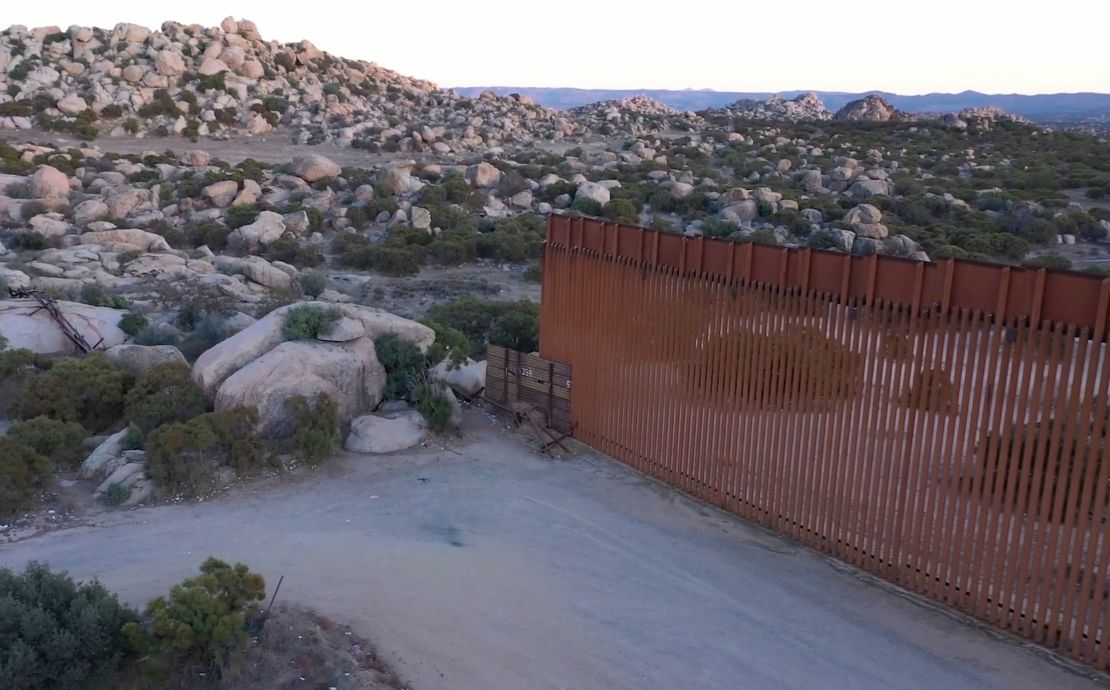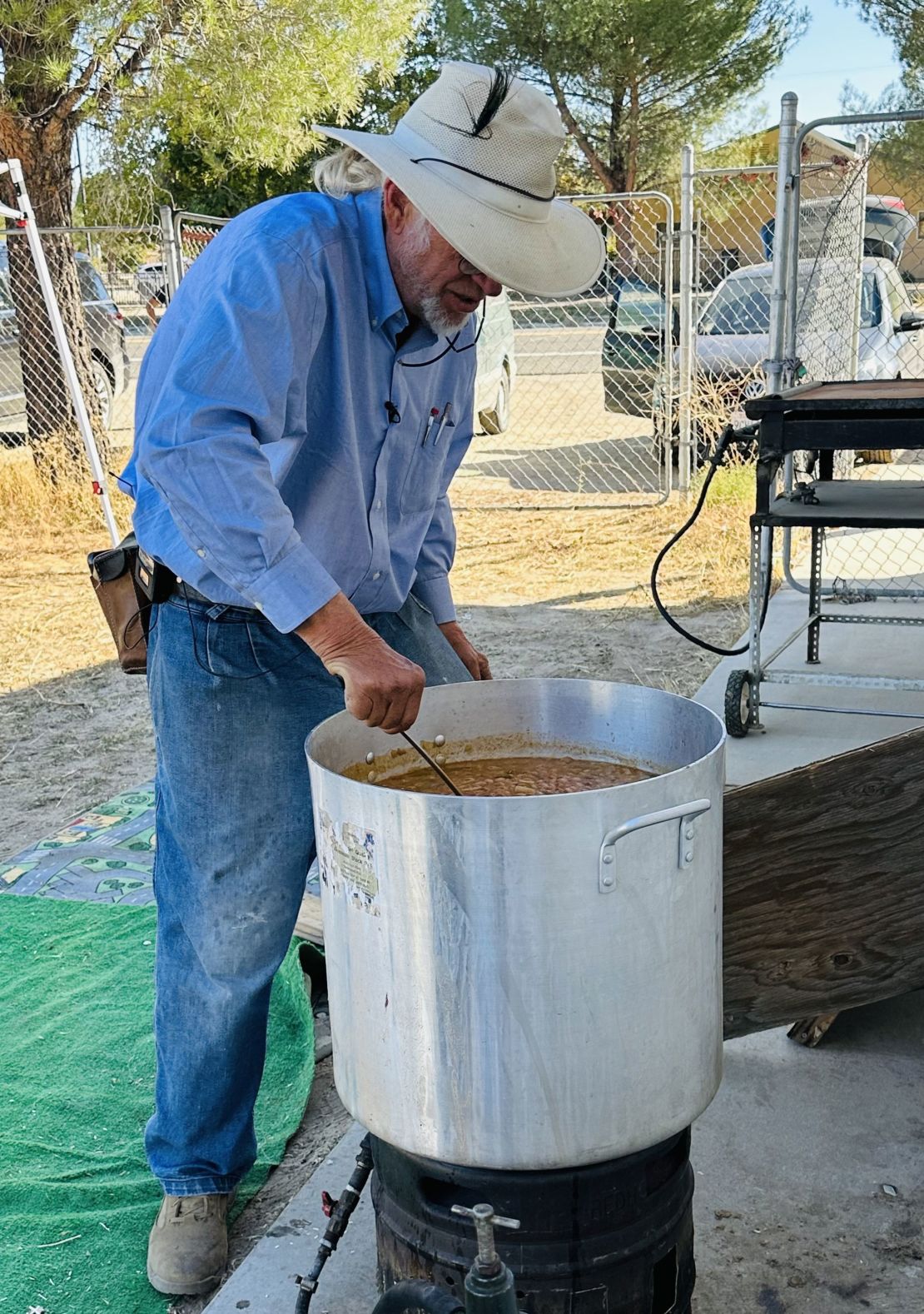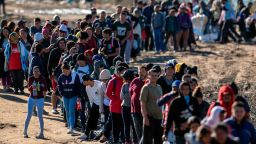Brian Silvas’ three dogs were usually the first to alert him that large groups of people were walking onto his San Diego County property. He’d wake up at all hours to Whisky, Soldier and Freedom barking incessantly. Today, the trio keep quiet most of the night. While the crowds of migrants have not stopped passing through, it’s become so common that the dogs now sleep through it.
“This country was built on immigration. I’m fine with that,” Silvas said. “But not like this. This is ridiculous.”
Two years ago, Silvas bought 78-acres of land on the Southern California border with Mexico, about 75 miles east of San Diego. His land is marked by hills and large boulders. The border wall ends a few feet into his property, leaving only the rocky desert terrain and a modest razor wire fence as a barrier.
“If I had the money, I would build my own wall right here!” Silvas said.

Instead, he witnesses dozens, if not hundreds, of migrants crossing onto his land each day. An influx he says that has worsened since the expiration in May of Title 42, a pandemic-era public health measure that allowed authorities to turn away migrants at the border.
“Sometimes there are huge groups of men and women, and I don’t want them through here,” Silvas said.
About five miles east of Silvas’ property, along the same southern border, Jerry and Maria Shuster are experiencing a similar crisis. Except the migrants who cross there are not just passing through their land – they’re also camping out. Tents, discarded clothes and trash are scattered across parts of their 17-acre property. There are several campfires burning at night as the migrants try to keep warm in the near freezing temperatures, as they make their way to various gathering spots along the US side and await officials with the US Customs and Border Protection.
“(My trees) are all gone. They chop them up and put them in the fire,” said Jerry Shuster, who alleges one group of migrants broke a wood fence on his property to fuel their fire.
The Shusters have lived in Jacumba Hot Springs for more than 40 years. Jerry emigrated from the former Yugoslavia. Maria is from Mexico.
“The government should do something (to) stop this illegal immigration,” Maria Shuster said. “Stop it because (the migrants aren’t) helping us; they’re destroying us.”

Uber for migrants
For years, migrants who crossed illegally into the United States would often run away from law enforcement, but now once reaching the US most run to authorities, according to observers. They’re eager to be processed, knowing that they will likely be released in a few days to await court dates that could be years away.
The San Diego Border Patrol Sector has reported more than 230,000 encounters during the fiscal year that ended in September – a level of activity the agency has not seen in over two decades.
Most of the migrants entering San Diego County appear familiar with the process, as though they’ve been prepared by others who’ve successfully arrived before them. They gather at various spots on the US side and await CBP officials, who then line them up, give them a tag for their one carry-on bag, and use a smartphone app to photograph the migrants as they hold up their documents. The men are then handcuffed to each other before boarding buses.
The buses first take them just a few miles to area detention centers to be processed over a few days. They’re then transported north to transit hubs in San Diego, where county officials say the vast majority travel to other cities.

Border Patrol agents struggle communicating with many of them, instead relying on hand signals or smartphone translation apps – assuming the cell signal is strong enough. Spanish and English are no longer sufficient, as local volunteers have documented people from more than 40 countries crossing in recent months, including China, Turkey and Uzbekistan. Many migrants are fleeing worsening economic conditions in their home countries, while others say they’re escaping political oppression and physical threats carried out by their governments.
The Shusters are frustrated and feel helpless.
“The migrants have more rights than we do,” Maria Shuster said, alleging that Border Patrol and the local sheriff’s department have told them they’re not allowed to force the migrants off their property.
A senior CBP official told CNN, “Stopping people from entering private property or arresting people for trespassing, that’s a local law enforcement responsibility.”
In a statement to CNN, the San Diego County Sheriff’s Department said, “Given the nature of trespassing the offenders would likely be cited and released a short distance away. This would scatter asylum seekers across the communities… and further complicate CBP’s response efforts to process, identify, screen, and ultimately transport the asylum seekers out of the area.”
The office also says it sympathizes with border residents, but its hands are tied since California law largely prohibits state and local law enforcement from assisting in the enforcement of federal immigration laws.
Silvas, meanwhile, questioned the CBP’s role on the border: “The Border Patrol agents, I know that they didn’t sign up to be Uber, because that’s all they are right now is Uber.”
The people trying to help
The migrants wear wristbands, handed out by CBP agents, that note the day they arrived at one of the many makeshift camps on the California side of the border. It helps agents prioritize those who should be bused out to keep migrants from camping out in dire conditions for multiple days. There are also volunteers who make the rounds each day, setting up tables and handing out meals.
“I saw the people there and just realized they didn’t have any water and started bringing water and it just kind of snowballed from that into this,” said Sam Schultz, a local resident who since May has taken it upon himself – working with some of his family members and other volunteers – to feed several hundred migrants two meals a day. “These people just want a better life. I mean, that’s really the truth.”

Dr. Diana Cantu spent a day at one of the camps with four of her UC San Diego medical school students. They wrapped injured wrists, knees and ankles, and handed out cold medicine and blankets as the temperatures quickly plummeted.
“This is real medicine, doing this, helping people,” Dr. Cantu said. “And (yet) you feel like you can’t really help them too much. (Still, the migrants) are extremely grateful.”
Schultz has noticed how the migrants are now eager to be taken into custody.
“They show up and it’s like they make the sign which is universal, which is I want to be arrested and they’re going, ‘Where’s the guy?’” Schultz explained, crossing his wrists in the air as though they’re in handcuffs. “I’ve never seen any of that before.”
Schultz said some migrants arrive not fully realizing the larger immigration crisis and dysfunction they’ve walked into, and some seem to not realize he’s a volunteer choosing to spend his time helping.
”I had this Chinese guy come up to me and he’s been there for two nights at one of these camps… and he says, ‘Look, who’s in charge?’ Like… ‘I gotta talk to the manager, this is just unacceptable,’” Schultz recounts with a chuckle.
Still, he is not dissuaded from doing what he believes is the right thing.
“I can understand why people are angry about these people coming across because it is a very strange and unusual and technically, completely illegal situation,” Schultz said. “(But) I cannot abide as a Christian to see people hungry and thirsty regardless of any other consideration.”
Schultz is not optimistic the government will find a solution to the crisis.
“I mean, it is gonna take a policy change on a level that seems to be completely ignoring it at this point,” he said.
For Silvas, a self-proclaimed conservative who feels his property is being overrun, there is no political party that can ease the issue.
“Left wing, right wing… same bad bird,” he said, stroking his dog Whisky, who is dozing off next to him and keeping warm by a fire.








